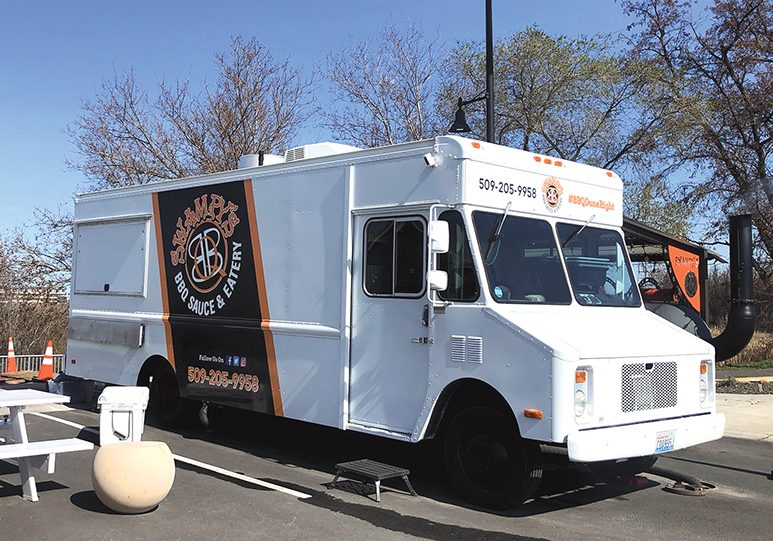
Home » Food truck owners unite to tackle barriers to growth
Food truck owners unite to tackle barriers to growth

March 16, 2020
Editor's note: Ron Swanby is one of the co-founders of the new Southeastern Washington Food Truck Association, formed to give a voice to food trucks in this region. A version of the Tri-Cities Area Journal of Business story about the new association is below this update from Ron, given March 20. The original story has been revised to reflect that an upcoming event is canceled as a result of efforts to contain the spread of coronavirus.
Business is swamping Swampy's BBQ Sauce and Eatery, a food cart at Kennewick's Columbia Gardens Urban Wine & Artisan Village near the cable bridge.
Owner Ron Swanby said he could continue to take advantage on the surge of business related to efforts to slow the spread of the coronavirus that causes COVID-19 prompted restaurant closures\s and other steps.
But he's not.
Swampy's will close March 21.
Swanby said he needs to protect employees and family members with compromised immune systems.
But before closing, he said he's been awed by the generosity of the Tri-Cities community. Tips have been huge - one visitor left $82, ensuring workers earned more from tips than in wages that day.
Another visitor spent bought $1,000 worth of $20 gift cards to hand out to workers at local grocery stores, later telling Swanby he'd done it five times.
"We've seen a lot of generosity," he said. He said he may return to the smoker stationed at Columbia Gardens to cook barbecue and deliver it to first responders and others who are working during the coronavirus pandemic.
"If we look at the big picture, this is a small amount of time," he said. "We will get through it."
A modified version of the original story follows.
The Mid-Columbia’s food truck industry is growing up – and speaking up.
The newly-formed Southeastern Washington Food Truck Association formed in 2019 to give gives voice to the roughly 100 or so food carts authorized to serve the public in Benton and Franklin counties.
Led by Andrew Chilton, owner of Doggie Style Gourmet, and Ron Swanby of Swampy’s BBQ Sauce & Eatery, the group began meeting in to boost representation they felt was missing.
The group had planned to make its public debut with its first-ever Food Truck Showcase on March 21, but the event was canceled after Gov. Jay Inslee took unprecedented steps to curb the spread of coronavirus that included closing schools until April 24, ordering restaurants to stop serving dine-in customers and restricting places where people gather.
While the showcase is off, the association is using its Facebook page to support the industry during the crisis.
Many food trucks remain open although they’re facing competition from brick-and-mortar businesses that have converted to pick-up delivery models.
Prior to the crisis, Swanby said food truck vendors sought a showcase for catering, the lesser-known side of the mobile food business. It’s a common sideline for truck operators but requires a whole separate level of planning and marketing.
Caterers submit distinct menus to the Benton-Franklin Health District food safety team for review. The demands of a special event don’t always overlap with day-to-day customers for trucks, said Swanby, whose barbecue truck is based at Columbia Gardens most of the time.
“When we go to a wedding, we’re not sitting there making barbecue sandwiches,” he said.
Swanby said the association wants to serve operators from Walla Walla to Moses Lake and everywhere in between.
It intends to launch a website offering education and planning services and plans to serve as the voice of the local industry.
There is significant overlap with the statewide association, which advocates for streamlined permitting and lower event fees, among other issues restricting the food truck industry.
The local association will press event operators to reduce or eliminate fees. Swanby said they typically run $250 to $350 per event. The added cost makes it impossible for most trucks to make a profit working events without boosting prices.
Raising prices at events angers regular customers, he notes.
He cited local efforts to organize a food truck rally in Pasco, which included charging the food trucks a fee to be at the event.
“If no food trucks go, there’s no rally,” Swanby said.
The association wants to serve as a resource for planners as well so they can work with food truck operators to create events that are profitable for everyone. Online calculators will help planners understand how many trucks they need and avoid bringing in too many.
He called weddings a special challenge.
“We’ve been asked to do a wedding where there’s four food trucks for 100 guests. Twenty-five people will not pay any bills,” Swanby said. “You will not make any money.”
The food truck industry is slowly but surely gaining traction in the Tri-Cities.
The Benton-Franklin Health District identifies nearly 100 of the food-related businesses it inspects as “carts” or “mobiles.” They range from shaved ice stands in parks to operators that rival full-service restaurants for the depth of their offerings.
The state food truck association and the state Department of Revenue say there is no reliable method to assess the economic impact of food trucks on the state’s economy.
IBISWorld, a market research firm, said there were nearly 24,000 food trucks in the U.S. in 2019.
The industry expanded at an annual rate of 5.8 percent over the five years prior to that. Growth is hindered by regulations that govern hours, proximity to restaurants, parking and licensing, it noted in its 2019 review of food truck trends.
“Industry associations will need to work closely with city governments and other restaurateurs to resolve these issues if food trucks are to play a larger role in the food service sector,” IBISWorld cautioned.
Local News
KEYWORDS march 2019





